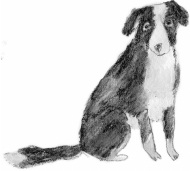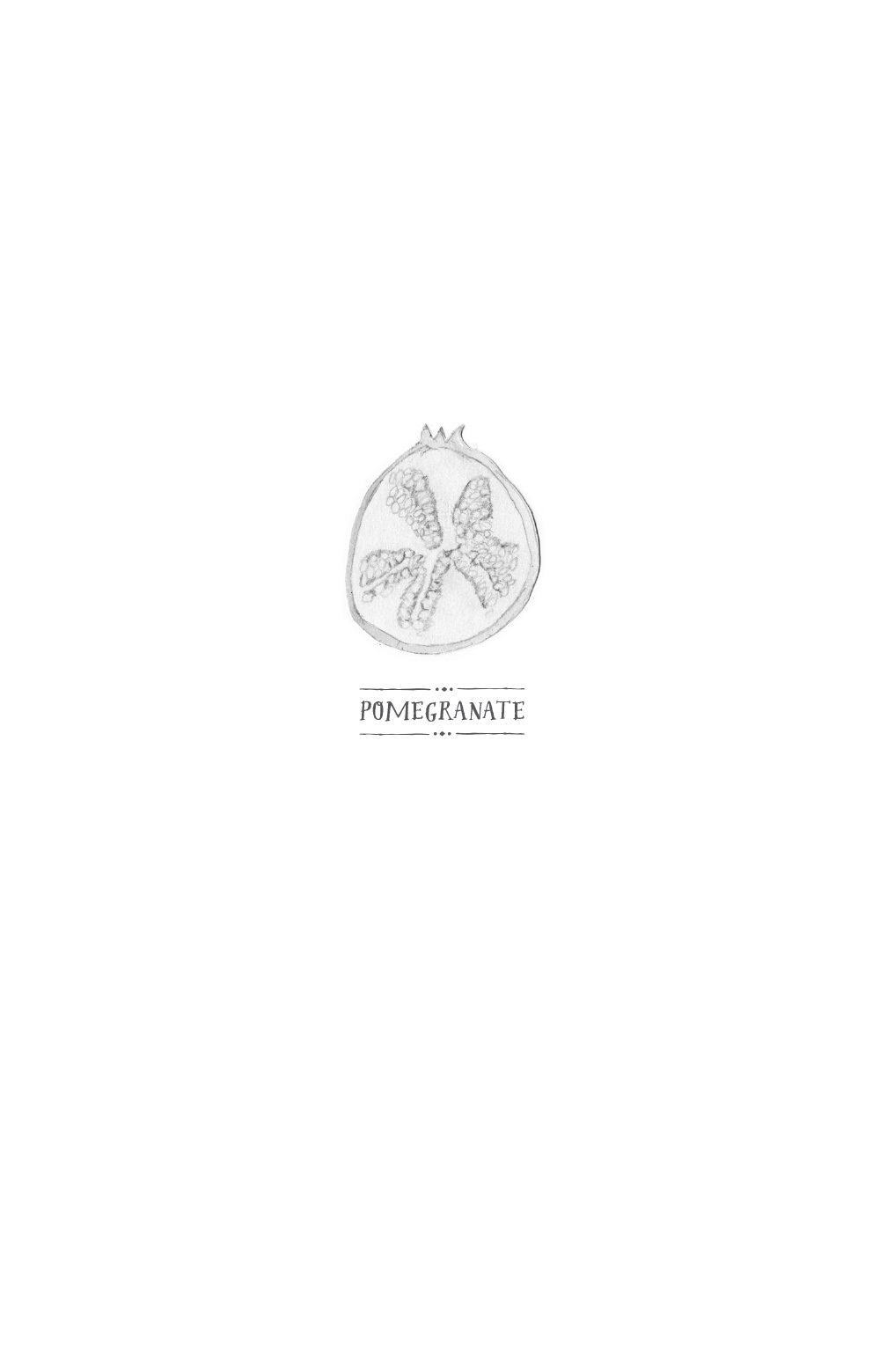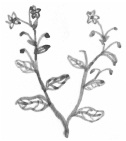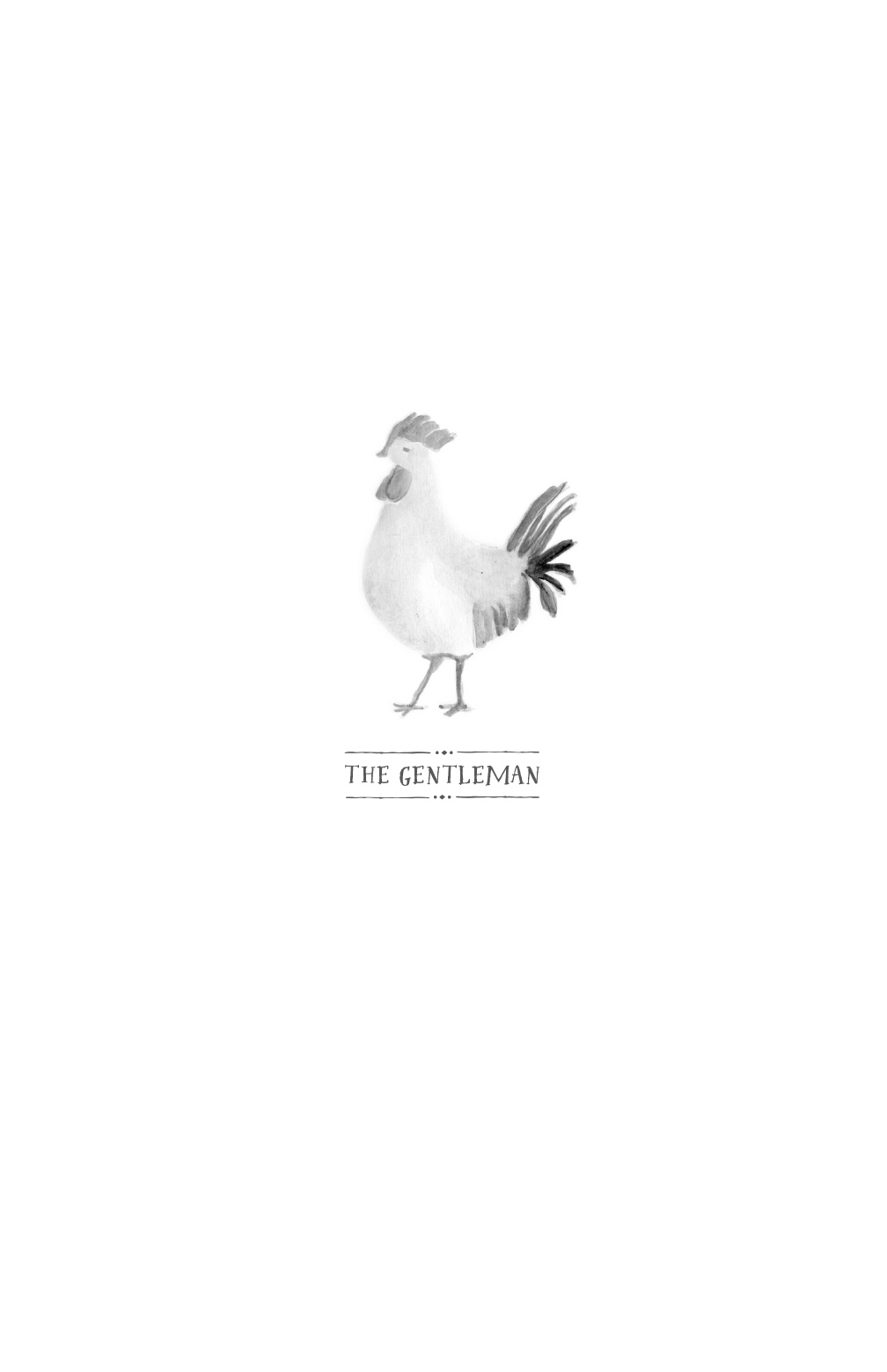Molly and Pim and the Millions of Stars (2 page)
Read Molly and Pim and the Millions of Stars Online
Authors: Martine Murray

Molly went back to bed with her crumpets and ate them by herself. Once they were
gone, she let herself feel sorry for Claudine. It was a shame that she didn't appreciate
Egyptian dances and nice old folk songs, or get to eat crumpets. Molly went and fetched
Claudine and plonked her on the pillow so she could lick away the crumbs and blobs
of dripped jam. This way her mama wouldn't notice that she'd eaten crumpets in bed.
Claudine stood and licked in an elegant fashion. She was quite partial to blackberry
jam. It must be what cats eat in Paris, thought Molly as she pulled on her boots.
Then she marched outside to let out the Gentleman and the chickens and set off towards
the woods to find her mama.
The woods were not far, just over a bridge and a little way up the dirt road. The
deeper Molly went into the woods, the thicker and darker
they became. The tops of
the trees crowded the sky and let the light filter down and spread in patches on
the ground. Molly was not scared of the woods with their moments of darknessâshe
had followed her mama in there lots of times.
The birds were noisy and Molly felt sure that if she listened well enough they would
tell her where her mama was. But Molly also knew that if she kept stomping along
her mama would find her, as her mama was always quiet and watchful and listening,
almost as if she was a creature herself.
Sure enough, it wasn't long before her mama appeared, landing silently on the path.
With her was Maude the dog, a black-and-white collie with slightly-too-large, black,
hairy, upstanding ears and a freckled nose. Maude dropped a stick at Molly's feet.
Molly picked it up and threw it, and Maude dashed off after it. She was so easily
pleased.

Molly's mama smiled and pulled off her straw hat with the red ribbon. A patch of
sun made her mad curly hair shine like a halo. Her legs were bare except for her
scuffed white sneakers, and she wore an old, faded, sundress with a cardigan. She
wound her hair up and stuck a wooden pin in it and bent down to kiss Molly's cheek.
âMolly,' she sighed, âYou're not even dressed. You're wearing pyjamas.'
âAnd you're not even at home,' declared Molly. âAnd I'm meant to be at school.'
Her mama smiled. She was not fussed about school. âReally? Is it already that time?
I was distracted. Did Claudine show you the note I left? I made you a fruit salad.'
She put down her basket of herbs, and Molly peered into it. Miner's lettuce, purslane,
rosehips and saltbush berries.
There was a time when Molly had known a lot about herbs, but she had recently decided
not to know anything about them at all.
âClaudine didn't even say good morning. I had to make crumpets.'
Molly could tell her mama's thoughts were elsewhere. She hardly seemed to register
that Molly had eaten crumpets instead of fruit salad.
Molly tugged at her mama's hand as they walked along the track. Her mama looked at
her, with surprise. It always surprised her when Molly noticed things. In fact, most
things surprised her: it was as if she never suspected anything would happen, but
things always did. She pulled her cardigan close.
âIt's the neighbours,' her mama shuddered. âThey're complaining again.'
The neighbours were staunch, zipped-up, sneering people, who glanced away when you
went near them, but were always peering over fences and squinting into everyone else's
lives. They despised unruly back gardens with dogs or birds or noisy children, and
they had appointed themselves the neighbourhood watchdog of all things overgrown,
out of bounds or against the rules. Their house was a grim brick house with
a pebble-mix
front garden, in which sat a white tortoise made of clay. There was a flagpole in
the front, and on certain days they raised the nation's flag. It made Molly feel
mutinous every time she saw it.
Prudence Grimshaw had a long narrow head and short colourless hair, which rose upward
and hovered above two stabbing eyes and a short line of lip. Ernest Grimshaw was
rarely seen, though when you did see him, mostly all you noticed was a very prominent
chin and an even more prominent stomach, which thrust him forwards at a determined
pace towards his large black car whose doors he slammed with gusto.
The Grimshaws were the biggest complainers in the world, and the most unlikeable
people Molly had ever met.

âYou were late again, Molly,' Ellen Palmer said at recess.
Molly didn't like the way Ellen stated the obvious, but she was prepared to overlook
it because Ellen Palmer was her best friend, her always-there, dependable best friend.
Also, Ellen had an enviably normal life, and Molly believed that if she stayed close
to Ellen Palmer's normal life, it might rub off on her. Molly tried hard to hide
all the not-quite-normal parts of her own life. Having a mama, for instance, who
went collecting
wild herbs at dawn was something Molly thought best kept to herself.
Molly glanced at Ellen's morning tea. It was in a packet. An apricot muesli bar.
Molly had a pomegranate. She chewed resentfully at the dark pink pips. What she wanted
most of all was not to stand out one bit.
Ellen had plaits and a mother who helped out at craft class and a father who could
fix shelves and a brother with a footy. And they all lived in a red brick house with
a dishwasher and a trampoline. Molly's house might have looked like a normal house
from the outside, but on the inside it was quite different. As soon as you walked
in, instead of a pleasantly regular feeling, there was an airy, open space with not
one proper corner or straight line. Scatterings of large brightly patterned cushions,
Persian carpets, billowy curtains, and low-lying beds covered in sequinned rugs made
the room feel like a gypsy caravan. The walls were lined with shelves of books, bottles,
candles, little
statues, carvings, pot plants and trinkets from faraway places. Molly's
older twin brothers had moved out of the house, first into an old caravan in the
garden, and then they had gone further, to faraway places with exciting names like
Morocco, Madagascar and, lately, Cuba.

âI slept in,' Molly declared and blew a pip out of her mouth towards the sandpit,
only it didn't make it that far. It landed quite near Ellen's foot in its brand new
lime-green sandal. Ellen squished it with her toe.
âWhat's that?' she said. âIt looks weird.'
âPomegranate,' said Molly.
Ellen showed no further interest in the pomegranate and twirled her lime-green sandal
admiringly.
âThe Egyptians buried their dead with pomegranates,' Molly elaborated. Sometimes
Molly was disappointed by Ellen's lack of interest in interesting things. She stood
up quickly and pointed at Pim Wilder, who was the oddest boy in the school.
Pim was bent in a suspicious way over the school vegetable patch, as if he was talking
to the silverbeet. Pim Wilder was always worth watching. He was either up to something
or getting in trouble for something. And if he was getting in trouble, he never showed
any shame. Instead a smile played across his eyes. Rules just seemed to limit him.
It was as if he could hardly bring himself to even consider them, let alone obey
them. But facts about the world sprung him to life. In class he offered up the strangest
sorts of knowledgeâabout birds, planets, outer space, music. He once told them of
the now-extinct elephant bird of Madagascar that laid an egg that weighed as much
as a small child. And a homing
pigeon in World War Two who lost an eye and a leg
while carrying a message, then won a medal and had his leg replaced with a wooden
one. He said that Earth is the only planet not named after a God, and that each winter
about one septillion snow crystals drop from the sky.
âWhat's a septillion, anyway?' sniggered Bruce Layne.
âA trillion trillions,' replied Pim. Bruce Layne sniggered again, because he had
to hide the fact that he didn't know what a trillion was either.
Pim Wilder wasn't talking to the vegetables. He had pulled off a seed head and was
examining it in the palm of his hand.
Molly was secretly fascinated by Pim Wilder. He didn't move with the pack. He wasn't
drawn by the cool talk and the latest fads. And this made him interesting, and a
little intimidating too. Ellen was afraid of him. But Ellen was easily afraid. She
would never walk in the woods on her own or rescue a spider from the bath. If Molly
told Ellen
about her mama's herbs and potions, Ellen might even find this too strange
and scary. Molly never told anyone about her mama's potions. Already, everyone thought
it was funny that her mama rode a yellow bike with two seats, one for Molly, and
that when it rained she fastened umbrellas to the handlebars. Pim Wilder would probably
love her mama's bike.
As if he heard her thinking, Pim turned towards them. Ellen clutched at Molly's hand
as he walked over, with his shoulders happily bunched upwards. He was brimming with
a secret joy.
âI'll tell you something,' he said. âWhen you see the seeds of a plant, you see something
that's been there since the Roman times. The Romans had those same seeds growing.
That's historical. That's likeâ¦' He trailed off and turned his face to the sky, as
if he might see something there, something historical. But perhaps he saw something
else, because, without even a beat or a nod, he walked away.
Ellen shook her head. âHe's strange.'
Molly nodded. Even though Ellen found a lot of things strange, it was important to
agree. Because Molly liked Ellen. Because Ellen wasn't a sniggerer, and she wasn't
a boaster either. Molly had been best friends with Ellen from the very start of school
when Ellen had wept because a frog got cut in half in the sandpit by Toby Nottingham's
spade. Ellen could sing like a canary, and often you could hear her coming because
of the little song that floated ahead of her. Her world was like a nest, comfortable
and safe and just her size. And Ellen was like a little bird, in fact. Molly did
always like those little birds the best in her own garden. The littlest birds sang
the nicest songs.
But Pim, with his outer-space dreams, was way too big to make sense to Ellen.
If Molly was going to be a part of Ellen Palmer's world of songs and pop starsâthat
glorious up-front world that trembled with star-like explosions in pink, in plastic,
in homely razzle-dazzleâthen it was important that no one knew she was curious about
Pim Wilder.

